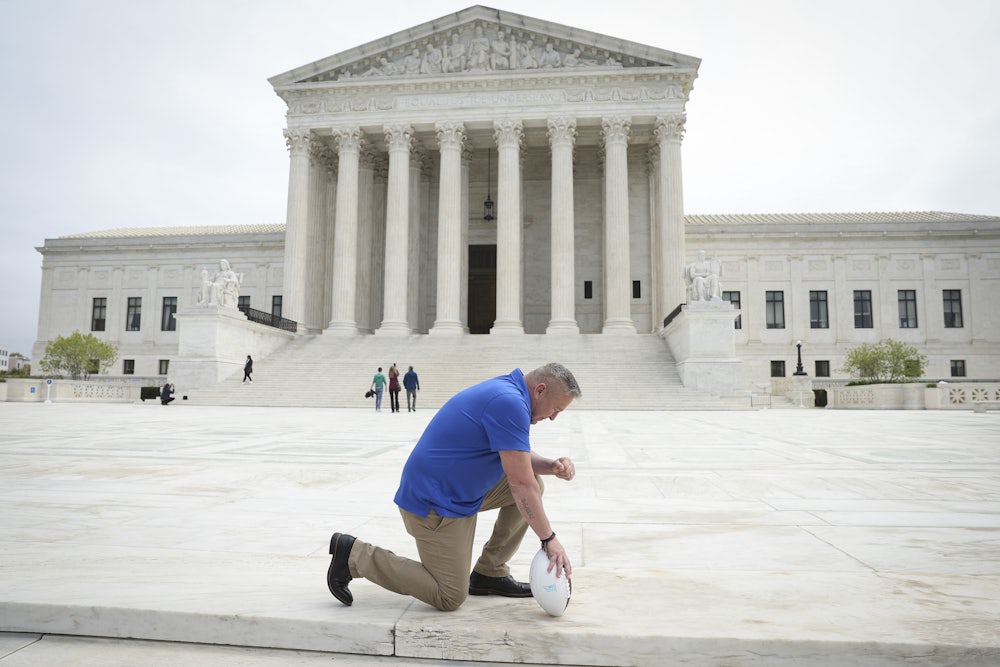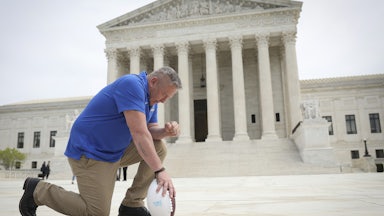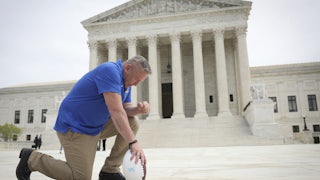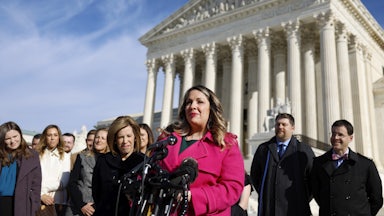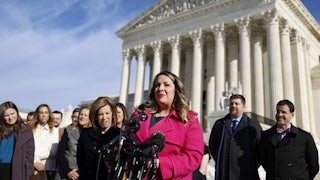Summer is over, and football is back. The National Football League’s 32 teams have just begun the first week of their season. Hundreds of college football teams kicked off their games in front of millions of students and fans last weekend. Thousands of high school football players and coaches are currently gearing up to play under those Friday night lights this week.
But Joe Kennedy won’t be among them. The assistant coach of the Bremerton High School football team in Washington state quit his job after participating in just one game last week. Kennedy’s employment status is generally not worthy of national attention on its own terms. This particular coach, however, waged an eight-year legal battle to reclaim that job and got the Supreme Court to reshape the balance between church and state in public schools along the way. He won the case, he got his job back, and then he quit almost immediately.
I have written before about the Supreme Court’s tendency in recent years to take what I have charitably described as “phantom docket” cases. But these might be more simply described as fake: They rest upon nebulous theories of standing, hypothetical injuries, and right-wing causes célèbre. Phantom-docket cases have allowed the court’s conservative majority to rewrite precedents while avoiding any immediate real-world consequences of their rulings. Yet even by those standards, Kennedy’s case might be the most phantasmal of them all.
The basic course of events was as follows. Kennedy worked as a part-time assistant football coach in Bremerton. He often prayed before and after football games, at first silently by himself and then with students. After the school district learned of the prayers with students many years later, they conducted an inquiry into the practice and, fearing litigation, tried to get him to hold nondisruptive private prayers instead. He eventually chose to hold public prayers with media figures and elected officials in defiance of the district’s requests.
After this escalation, the district put Kennedy on paid administrative leave and the head coach recommended that he not be rehired next season because of the disruptions he had caused. Kennedy declined to reapply for his job, then sued the school district for violating his First Amendment rights to free speech and religious practice. In those legal proceedings, Kennedy framed his case as one of a humble football coach whose quiet prayers were squelched by a hostile school district.
“The decision below reached the remarkable conclusion that the Constitution prohibits what it protects twice over,” he explained in his petition for review for the Supreme Court, referring to the lower-court rulings against him. “Petitioner Joseph Kennedy is a former football coach at a public high school who lost his job after kneeling at the 50-yard line after a high school football game to say a brief, quiet prayer of gratitude.”
This version of events was a powerful and apparently irresistible narrative for legal conservatives. Secular school administrators punishing a small-town high school football coach for quietly praying after a game is potent imagery, evoking a wistful Americana that is now threatened by godless liberalism. Unsurprisingly, conservative jurists went out of their way to denounce the school district for its actions and side with Kennedy at every stage of the case.
Judge Diarmund O’Scannlain, the dean of the conservative wing on the Ninth Circuit Court of Appeals, wrote an impassioned dissent from that court’s refusal to reconsider a panel’s ruling against Kennedy. The panel’s ruling, he claimed, “obliterates” Kennedy’s First Amendment rights “by announcing a new rule that any speech by a public school teacher or coach, while on the clock and in earshot of others, is subject to plenary control by the government.
“Indeed, we are told that, from the moment public high school football coach Joseph Kennedy arrives at work until the very last of his players has gone home after a game, the Free Speech Clause simply doesn’t apply to him,” O’Scannlain continued. He framed the situation in stark, minimalist terms: “Kennedy lost his coaching job because he refused to abandon his practice of kneeling on the field and uttering a prayer after each football game.”
But this interpretation of events, O’Scannlain’s colleagues noted, left out important context. Judge Milan Smith, a George W. Bush appointee, described at length how his colleague had omitted essential details and framed what happened in misleading terms. Kennedy, he noted, was not merely offering silent, private prayers but engaging in a much larger religious activity with students under his supervision and even coaches and players from other schools. Moreover, even as the school district tried to accommodate Kennedy’s religious practices, Kennedy chose to escalate them into a spectacle by declaring that he would pray in the middle of the football field immediately after the October 26 game.
“He advertised in the area’s largest newspaper, and local and national TV stations, that he intended to defy BSD’s instructions not to publicly pray with his players while still on duty even though he said he might lose his job as a result,” Smith recounted. “As he said he would, Kennedy prayed out loud in the middle of the football field immediately after the conclusion of the first game after his lawyer’s letter was sent, surrounded by players, members of the opposing team, parents, a local politician, and members of the news media with television cameras recording the event, all of whom had been advised of Kennedy’s intended actions through the local news and social media.”
Smith then chastised his colleagues by name for falling for Kennedy’s self-serving stories. “Unlike Odysseus, who was able to resist the seductive song of the Sirens by being tied to a mast and having his shipmates stop their ears with bees’ wax, our colleague, Judge O’Scannlain, appears to have succumbed to the Siren song of a deceitful narrative of this case spun by counsel for appellant, to the effect that Joseph Kennedy, a Bremerton High School (BHS) football coach, was disciplined for holding silent, private prayers,” Smith wrote in a concurring opinion from the Ninth Circuit’s refusal to rehear the case. “That narrative is false.”
Ultimately, the Supreme Court proved just as unable—or perhaps just as unwilling—to look beyond the falsehoods spun by Kennedy and his lawyers. Justice Neil Gorsuch, writing for the majority, described the saga in the opening paragraph of his majority opinion in almost unrecognizable terms—unrecognizable, that is, unless your understanding of the case’s facts comes entirely from Kennedy’s own briefs.
“Joseph Kennedy lost his job as a high school football coach because he knelt at midfield after games to offer a quiet prayer of thanks,” Gorsuch wrote, about events that never took place. “Mr. Kennedy prayed during a period when school employees were free to speak with a friend, call for a reservation at a restaurant, check email, or attend to other personal matters. He offered his prayers quietly while his students were otherwise occupied. Still, the Bremerton School District disciplined him anyway.”
Along the way, Gorsuch used the opportunity to overturn Lemon v. Kurtzman, a Supreme Court ruling in 1971 that set up what was known as the “Lemon test” for establishment clause cases. Conservatives have long opposed the ruling on multiple grounds, including for the allegedly short shrift it gives to religious practices. In its place, Gorsuch emphasized the conservative majority’s preferred replacement test, which instead commands that “the Establishment Clause must be interpreted by reference to historical practices and understandings.”
The court’s liberal justices, like their lower-court colleagues, did not hesitate to call out the majority for the misleading portrayal of Kennedy’s case. “To the degree the Court portrays petitioner Joseph Kennedy’s prayers as private and quiet, it misconstrues the facts,” Justice Sonia Sotomayor wrote for herself and the other two dissenters. “The record reveals that Kennedy had a longstanding practice of conducting demonstrative prayers on the 50-yard line of the football field. Kennedy consistently invited others to join his prayers and for years led student athletes in prayer at the same time and location. The Court ignores this history.”
To underscore that point, Sotomayor included three photographs of Kennedy’s activities that clearly show him leading prayer circles with students and opposing-team players. She chastised the majority for its blinkered view of the case, which stripped out the context that made the school district’s concern about an establishment clause violation much more credible. She noted, for example, that several parents had later contacted the school district to say that their children only participated in the prayers because they felt obligated to do so. (Coercion is a well-established red line in school prayer cases.)
Kennedy’s grandstanding, Sotomayor pointed out, had also thrown the school’s football program into turmoil. “The head coach himself also resigned after 11 years in that position, expressing fears that he or his staff would be shot from the crowd or otherwise attacked because of the turmoil created by Kennedy’s media appearances,” Sotomayor noted. “Three of five other assistant coaches did not reapply.”
To make things even more awkward, Kennedy no longer even lived in Washington state by the time his case had reached the Supreme Court. He had since relocated to Florida, calling into question whether he even wanted his old job back. When asked by The New York Times last spring about relocating to the state furthest from Washington, Kennedy insisted he would be on the “very first flight back” and was eager to return to his old job. “The biggest honor of my life was coaching these young men,” Kennedy told the Times. “No lie, we had blood, sweat, tears and death in the Marine Corps, but I got way more out of coaching than anything else in my life.”
Last month, however, his tune had changed. Kennedy told NBC News that while he felt a duty to return after the long legal fight, he had a new life in Florida to live as well. That new life brought him a much greater degree of prominence than he had before the case. Kennedy’s book about the saga is coming out later this year, complete with a book tour. He claimed that Ron DeSantis, with whom he said he’d recently had dinner, had asked him to support his presidential campaign, but Kennedy declined because his “loyalty is to [Donald] Trump.” Coaching high school football is no match for being “the praying coach” who took on secularism and won. The life of a right-wing folk hero can be a busy (and profitable) one.
This is not to say that Kennedy was obligated to work as a high school football coach forever after the Supreme Court’s ruling. Indeed, it is to his credit that he even went back to coach a single game at all. It would have been much simpler to take the victory and move on. But refusing to coach another game would have deprived this entire charade of the fig leaf it so desperately needed.
Almost everyone in this story got what they wanted in the end. Kennedy, who clearly wanted a greater degree of public prominence than he had before, now has a much more lucrative life ahead on the conservative media circuit. Kennedy’s lawyers, who championed his cause all the way to a Supreme Court victory, were awarded $1.7 million in legal fees paid to them by the school district. The conservative justices, who had long sought to overturn Lemon and refashion the establishment clause in their own image, got the opportunity to do so. Even the district won in a roundabout way: Kennedy clearly won’t be holding any more disruptive prayers at midfield after football games.
The loser in this case is everyone else. One of the most important limits on the Supreme Court’s power is that, under the Constitution, it can only hear actual “cases and controversies.” The justices can’t just wake up one morning and say X is constitutional and Y is not. They can’t issue advisory opinions based on what they think might happen or should happen. Someone has to bring them a real case with real stakes and real adversaries. Kennedy’s case shows how easily that check on their power can be obliterated if the justices want it to disappear, and how much they can reshape American law once it’s gone. All it takes is a story that is, both literally and figuratively, too good to be true.
